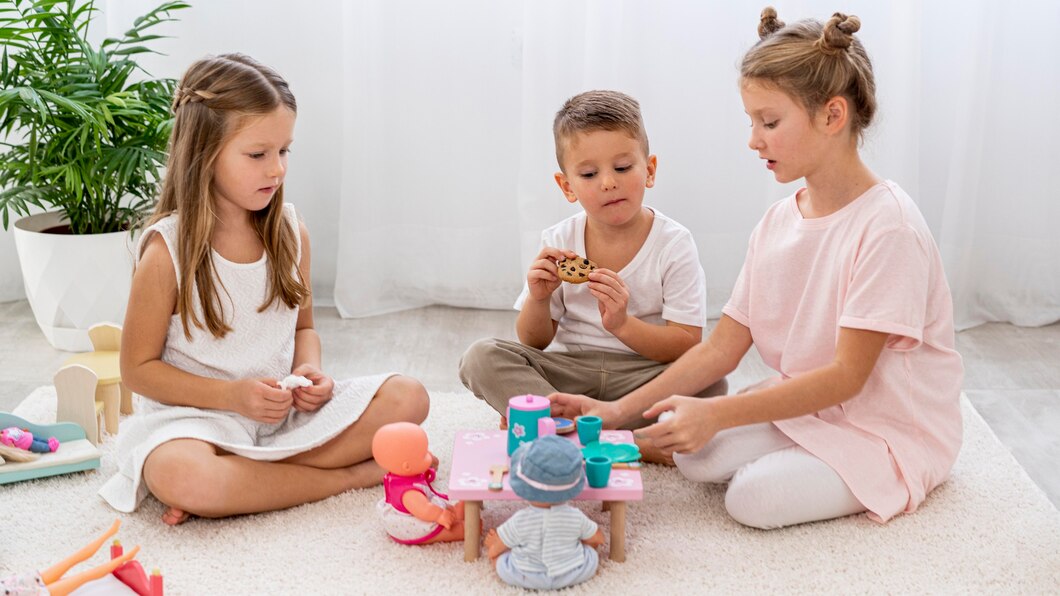One might think of pretend play as just another delightful pastime. The truth is, like a lot of kids’ activities, pretend play is more than just fun and entertainment. Children are not simply imitating adults here, but are also building skills that will last them a lifetime. From tea parties with stuffed animals to building imaginary castles, pretend play toys are all about creativity, critical thinking, and emotional intelligence. Pretend play is a foundational building block in children’s early childhood development in a lot of ways. Here are a few important ones.
Cognitive Development
Pretend play is a good opportunity for children to engage in problem-solving and abstract thinking. It can be a good tool for language development as well. In fact, a lot of studies show that kids who engage in imaginative play have better memory retention and improved attention spans. Their problem-solving abilities are also higher. These toys become an opportunity to role-play and understand the world from different perspectives.
Social Skills
Social skills like cooperation, negotiation, and conflict resolution are also enhanced as children engage in pretend play, as they have to play with friends. They learn more about roles, taking turns, and also about teamwork and empathy. Through these interactions, children learn to listen, empathize, and respond appropriately, and this can go a long way in their future.
One of the most important things a child needs to learn as they grow is to express feelings in a safe way. Pretend play toys make space for this. They may use a doll to express feelings that they cannot verbalize. It helps them grow up with heightened emotional resilience and self-awareness.
Communication Skills
Language flourishes in a pretend play environment. There is an active expansion of vocabulary and sentence construction in these games. Pretend play scenarios encourage children to articulate their thoughts, ask questions, and listen actively. It is in group play that children learn to adapt their communication style to their role. A ‘teacher’ will speak with authority, while a ‘student’ will ask more questions. Such subtleties make them better communicators as they go on.
Emotional Intelligence
Pretend play provides an outlet for children to rehearse complex emotions in a safe environment. They’re able to act out experiences that might be fearsome, exciting, sad, or joyous. It can make them familiarise themselves with different kinds of emotions and where to use them. Children who engage in pretend play more often are likely to handle their emotions better and will have more empathy. They learn how to respond to real-life problems with imagination and confidence.
Supporting Pretend Play at Home
Parents and caregivers can significantly nurture pretend play. Just creating an environment where imaginative play is allowed to happen can make a big difference. Here are a few tips:
- Give them a variety of props and costumes. Let them have the freedom to make things up.
- Have designated spaces for creative expression, maybe a ‘kitchen corner’ or a ‘reading nook.’
- Join in! Sometimes, having a parent become a ‘customer’ at a child’s pretend restaurant can foster hours of creative storytelling.
- Also, allow children to take the lead. Do not be too directive in their play, follow their cues and their imagination should guide the story.
Active engagement from parents is very important for kids as they can feel seen and heard. They are bound to enjoy the toys more this way too.
Long-Term Benefits of Pretend Play
The skills that children develop through pretend play have long-lasting effects. Creativity, critical thinking, emotional intelligence, and communication are not just skills in childhood; they are a necessity for adulthood. Pretend play toys support imaginative scenarios in kids and encourage a deeper level of engagement in them. Dollhouses, costumes, kitchen sets, and tool kits provide the props that children need to fully immerse themselves in their stories. The toys are also tactile; thus, helping kids develop fine motor skills and hand-eye coordination.
A child who learns to cooperate during an imaginative tea party may grow into an adult who excels in group projects. The child who learns to voice their imagination may become one who will lead. Pretend play is thus not just a simple enjoyable activity; it’s a key part of holistic childhood development. From developing cognitive skills to building social and emotional ones, pretend play builds the foundation of future success. Browse through a variety of carefully designed pretend play toys available on Skillmatics and gift your child with imagination and learning today. Let our children grow up to be confident, skilled, and competent adults with the help of good “pretense”!










